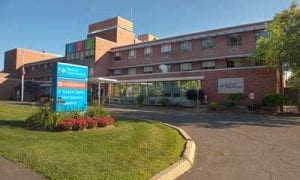BOSTON/SPRINGFIELD – Hospitals across the state are tightening up visitation policies in the wake of a nasty outbreak of influenza.
Boston declared a public health emergency yesterday as flu season struck in earnest and the state reported 18 flu-related deaths so far.
The city is working with health care centers to offer free flu vaccines and hopes to set up places where people can get vaccinated. The city said there have been four flu-related deaths, all elderly residents, since the unofficial start of the flu season Oct. 1.
“The best thing you can do to protect yourself and your family is to get the flu shot,” said Boston Mayor Thomas Menino.
The city was experiencing its worst flu season since at least 2009, Menino said, with about 700 confirmed cases of the flu, compared with 70 all of last season.
Massachusetts was one of 29 states reporting high levels of “influenza-like illness,” according to the most recent weekly flu advisory issued by the Centers for Disease Control and Prevention.
The CDC said the proportion of people visiting health care providers with flu-like symptoms climbed from 2.8 percent to 5.6 percent in four weeks. By contrast, the rate peaked at only 2.2 percent during the relatively mild 2011-12 flu season.
At Baystate Medical Center, visitors under age 14 are being asked to stay away while the flu hits western Massachusetts with a big, coughing wallop.
“We’re asking anybody under age 14 to stay home and we ask that patients here for appointments limit the number of people they bring with them to one,” said Dr. Sarah Haessler, who specializes in infectious diseases.
Other policies at Baystate, which were announced yesterday afternoon, include limiting visitors to hospitalized patients to two people and if someone is sick they are asked not to visit.
Haessler said the reason for the under 14 policy is that younger children are less apt to take precautions when sick.
“They don’t cover their cough or manage their sneeze,” she said, “so they are big spreaders of germs.”
Since the onset of flu season, Baystate Health has been asking visitors who are sick to consider returning home and calling the patient instead, or connecting with the patient via email or social media.
Haessler stressed that the new policies are temporary and will likely be lifted in a few weeks.
Across the commonwealth there are record numbers of residents with influenza-like symptoms. Haessler said according to the CDC, five percent of all outpatient office visits in Massachusetts right now are due to influenza-like illness.
Haessler said it’s the most cases of the flu seen since the pandemic in 2009.
“It’s not that there’s a new strain. It started earlier,” said Haessler about the record number of cases of the flu.
Haessler said the outbreak came about a month earlier than the typical influenza season. And she said the best way to prevent and combat it is with a flu vaccine.
“The flu shot is simple and it is in ample supply,” she said. “Many providers have the nose spray available for people who don’t like shots.”
While Baystate Medical Center is not offering a free flu shot clinic like Boston Hospital, it does offer the vaccination to all hospitalized patients.
“Doctor’s offices have it, there are clinics, pharmacies have it and stores like Target and Wal-Mart have it,” said Haessler.
She did acknowledge that some people who get vaccinated still end up sick, but not to the extent of people who are not vaccinated.
“And there are other reasons people get sick after they’re vaccinated because other illnesses are out there, such as the common cold and RSV,” she said. “People should get vaccinated – it’s safe and effective.”
City, state and federal officials have all identified a Type A influenza known as H3N2 as the predominant strain reported so far this season. The strain, historically associated with more serious illnesses, is among those covered by the current vaccine.
“No vaccine is 100 percent effective,” cautioned Kevin Cranston, head of the state bureau of infectious diseases. Some people, for example, might be vaccinated but get the flu in the 10 days to two weeks it takes for the immunity to take hold.
“There are any number of reasons why people could have done all the right things and still get the flu,” he said.
High flu rates were being reported all over Massachusetts, Cranston said, and while he didn’t have specifics on the 18 statewide deaths, he noted that the flu is most dangerous for the young, the elderly and people with other chronic health conditions.
“I hate needles, and I got (a shot),” Gov. Deval Patrick said yesterday, adding that he wasn’t aware of any shortages of vaccine in the state. He also reminded residents to use common sense, such as washing their hands and sneezing into their sleeves.







